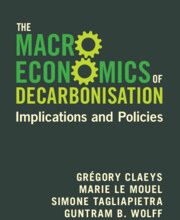Higher levels of economic activity tend to go hand-in-hand with additional energy use and consumption of natural resources. As fossil fuels still account for 80 percent of the global energy mix, energy consumption remains closely related to greenhouse gas emissions and hence to climate forcing. This paper explores whether decarbonisation and economic growth are compatible or whether the world economy needs to grow less to be able to reduce greenhouse gas emissions fast enough to reach net zero in 2050. The literature provides profoundly different answers to this question, with scholars positioning along a spectrum that extends from the most optimist version of ‘green growth’ theories to sceptical ‘degrowth’ theories.
While globally, CO2 emissions per unit of GDP are declining, the decoupling rate from 1995 to 2018 was only -1.8 percent annually. To achieve net zero by 2050, the rate would have to accelerate to -8.7 percent, assuming population and GDP growth projections as given, or by a factor of almost five. To keep GDP growth and population at their projections and thus reject the proposition of de-growth, decoupling would have to accelerate massively. Two avenues are crucial: reducing the energy intensity of production and/or the emissions intensity of energy. The huge fall in the price of renewable energy provides hope that decoupling can accelerate. Decoupling rates have accelerated in the last decade and decoupling is substantially faster in the European Union. In the EU, we estimate that decoupling only has to accelerate by a factor of 2.5.
We do not think degrowth propositions advanced in the literature will be pursued and therefore focus on the main challenges that must be tackled to achieve decoupling. Unprecedented efforts are required to achieve green growth. But hoping for humanity to sacrifice growth appears unrealistic.
Recommended citation:
Lenaerts, K., S. Tagliapietra and G.B. Wolff (2021) ‘Can climate change be tackled without ditching economic growth?’, Working Paper 10/2021, Bruegel


